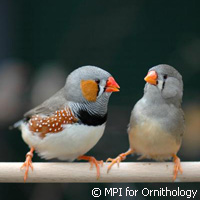Being unfaithful may be in our genes, scientists say
Zebra finches form monogamous lifetime partnerships, but both males and females indulge in extramarital sex. While the benefit for the males is clear - to sire more offspring - cheating for the females comes with the risk of losing their lifetime partner. German scientists suggest that females cannot avoid being promiscuous because they inherit many of the same genes responsible for promiscuous behaviour in males. The common thinking that most bird species lead a monogamous way of life was dispelled in past years when scientists used molecular genetic methods and found that many juveniles do not originate from their social fathers. An explanation for these extrapair paternities was that the males could enhance their reproductive success through a higher number of offspring. On the other hand, for the females, negative aspects prevailed. The betrayed males often reduce their parental effort and support from extrapair mates cannot be expected because they rather help their own mate. Therefore, the question remained as to why some females seek other males for extrapair matings. Ornithologist Dr Wolfgang Forstmeier and colleagues at the Max Planck Institute in Germany observed mating and display behaviour in more than 1,500 captive zebra finches from five consecutive generations. Using a video surveillance system the researchers were able to observe how mated females reacted to advances of their own partner and of stranger males. In addition, the researchers conducted genetic paternity analysis by using micro-satellite marker methods in order to determine the number of offspring that a male had sired in a foreign nest. They also identified the number of offspring that a female produced together with an extrapair male. The results published in Proceedings of the National Academy of Sciences (PNAS) on 13 June 2011 suggest that the predisposition for infidelity has a moderate, but evolutionarily crucial, genetic basis. Specifically, genetic variants found to enhance promiscuous behaviour in males - which results in more and varied offspring - may similarly promote promiscuity in females. 'It is not essential that there is an evolutionary benefit for the females,' explains Dr Forstmeier, lead author of the study. 'It is rather sufficient that the male ancestors had benefits that resulted from their promiscuity. A 'Casanova-gene' will increase its frequency within a population as long as the benefits to the male gene carriers outweigh the costs for the female gene carriers.' Genetic analysis revealed promiscuous males tend to sire promiscuous daughters and this explanation for 'playing away' may also apply to humans, believe researchers. 'The question to what extent it is the same genes that influence female and male behaviour in a similar way has to be answered in follow-up studies,' concludes Dr Forstmeier.For more information, please visit: Max-Planck-Gesellschaft: http://www.mpg.de/en Proceedings of the National Academy of Sciences (PNAS) http://www.pnas.org/
Countries
Germany



